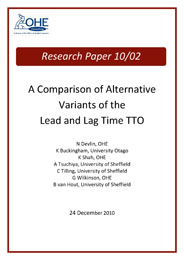OHE was awarded a UK Department of Health grant to further develop three aspects of health status indexes. Results of the second of these, advances in…
OHE was awarded a UK Department of Health grant to further develop three aspects of health status indexes. Results of the second of these, advances in Time Trade Off (TTO) methodology, are reported in this OHE Research Paper.
The aims of this research…
OHE was awarded a UK Department of Health grant to further develop three aspects of health status indexes. Results of the second of these, advances in Time Trade Off (TTO) methodology, are reported in this OHE Research Paper.
The aims of this research were to (1) investigate the values generated from lead-time (LT-TTO) using different combinations of the length of time the individual experiences full health and a particular health state; the order of these states also was varied (Lead v. Lag Time TTO), (2) gauge whether values generated from these methods concur with participants’ views as to whether the states are better or worse than dead, and (3) explore a range of methods for handling the preferences of those whose distaste for very poor health states is so great that they are willing to ‘use up’ all their lead time to avoid them.
The research showed that LT-TTO confers an important advantage over TTO by providing a single method capable of generating values that seem broadly in keeping with participants’ stated views about those health states being better or worse than dead. Values are sensitive, however, both to the length of time in full health relative to the duration of the state to be valued and to the order in which these occur (lead vs. lag time). For those who use up their lead time, additional ways of eliciting these preferences (through additional questioning) are feasible, as is modelling those values (through survival analysis). The preferences of a small (<5%) group of participants, however, are so ‘extreme’ that they cannot be captured by any approach.
A revised version of this paper has been published in Health Economics and can be downloaded from: http://onlinelibrary.wiley.com/doi/10.1002/hec.2819/abstract
Please cite as: Devlin, N., Buckingham, K., Shah, K., Tsuchiya, A., Tilling, C., Wilkinson, G., and van Hout, B., 2013. A comparison of alternative variants of the lead and lag time TTO. Health Economics, 22(5), pp.517-532.
